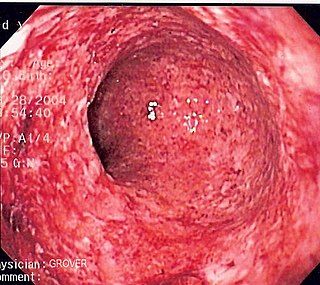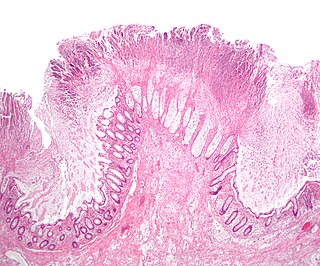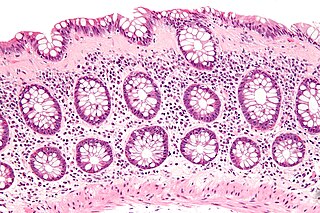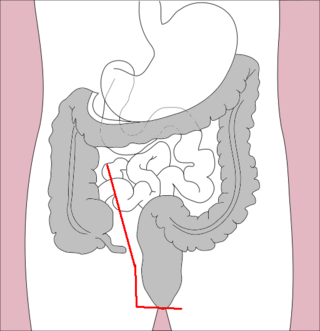Related Research Articles

Crohn's disease is a chronic inflammatory bowel disease characterized by recurrent episodes of intestinal inflammation, primarily manifesting as diarrhea and abdominal pain. Unlike ulcerative colitis, inflammation can occur anywhere in the gastrointestinal tract, though it most frequently affects the ileum and colon, involving all layers of the intestinal wall. Symptoms may be non-specific and progress gradually, often delaying diagnosis. About one-third of patients have colonic disease, another third have ileocolic disease, and the remaining third have isolated ileal disease. Systemic symptoms such as chronic fatigue, weight loss, and low-grade fevers are common. Organs such as the skin and joints can also be affected. Complications can include bowel obstructions, fistulas, nutrition problems, and an increased risk of intestinal cancers.

Ulcerative colitis (UC) is one of the two types of inflammatory bowel disease (IBD), with the other type being Crohn's disease. It is a long-term condition that results in inflammation and ulcers of the colon and rectum. The primary symptoms of active disease are abdominal pain and diarrhea mixed with blood (hematochezia). Weight loss, fever, and anemia may also occur. Often, symptoms come on slowly and can range from mild to severe. Symptoms typically occur intermittently with periods of no symptoms between flares. Complications may include abnormal dilation of the colon (megacolon), inflammation of the eye, joints, or liver, and colon cancer.

Hematochezia is a form of blood in stool, in which fresh blood passes through the anus while defecating. It differs from melena, which commonly refers to blood in stool originating from upper gastrointestinal bleeding (UGIB). The term derives from Greek αἷμα ("blood") and χέζειν. Hematochezia is commonly associated with lower gastrointestinal bleeding, but may also occur from a brisk upper gastrointestinal bleed. The difference between hematochezia and rectorrhagia is that rectal bleeding is not associated with defecation; instead, it is associated with expulsion of fresh bright red blood without stools. The phrase bright red blood per rectum is associated with hematochezia and rectorrhagia.

Inflammatory bowel disease (IBD) is a group of inflammatory conditions of the colon and small intestine, with Crohn's disease and ulcerative colitis (UC) being the principal types. Crohn's disease affects the small intestine and large intestine, as well as the mouth, esophagus, stomach and the anus, whereas UC primarily affects the colon and the rectum.

Colitis is swelling or inflammation of the large intestine (colon). Colitis may be acute and self-limited or long-term. It broadly fits into the category of digestive diseases.

Toxic megacolon is an acute form of colonic distension. It is characterized by a very dilated colon (megacolon), accompanied by abdominal distension (bloating), and sometimes fever, abdominal pain, or shock.
Crohn's & Colitis UK is a UK charity dedicated to Crohn's disease, ulcerative colitis, and other forms of inflammatory bowel disease (IBD). It was founded in 1979 as the National Association for Colitis and Crohn's Disease.

Collagenous colitis is an inflammatory condition of the colon. Together with the related condition lymphocytic colitis, it is a subtype of microscopic colitis, which is characterized by inflammation that specifically affects the colon, and a clinical presentation that involves watery diarrhea but a lack of rectal bleeding. Microscopic colitis does not usually cause macroscopic changes to the colon that allow a visual diagnosis during colonoscopy, instead causing microscopic changes that can be detected through histopathological examination of colonic biopsies. The nature of these microscopic changes is what differentiates collagenous from lymphocytic colitis, with the characteristic finding in collagenous colitis being depositions of collagen in the connective tissue between the colonic glands. Collagenous colitis, and microscopic colitis as a whole, is sometimes considered to be an inflammatory bowel disease (IBD) along with Crohn's disease and ulcerative colitis. However, little is known about the etiology of microscopic colitis, and so the degree of similarity to the inflammatory bowel diseases is uncertain.

Proctocolectomy is the surgical removal of the entire colon and rectum from the human body, leaving the patients small intestine disconnected from their anus. It is a major surgery that is performed by colorectal surgeons, however some portions of the surgery, specifically the colectomy may be performed by general surgeons. It was first performed in 1978 and since that time, medical advancements have led to the surgery being less invasive with great improvements in patient outcomes. The procedure is most commonly indicated for severe forms of inflammatory bowel disease such as ulcerative colitis and Crohn's disease. It is also the treatment of choice for patients with familial adenomatous polyposis.

Biological therapy, the use of medications called biopharmaceuticals or biologics that are tailored to specifically target an immune or genetic mediator of disease, plays a major role in the treatment of inflammatory bowel disease. Even for diseases of unknown cause, molecules that are involved in the disease process have been identified, and can be targeted for biological therapy. Many of these molecules, which are mainly cytokines, are directly involved in the immune system. Biological therapy has found a niche in the management of cancer, autoimmune diseases, and diseases of unknown cause that result in symptoms due to immune related mechanisms.
The Crohn's & Colitis Foundation is a volunteer fueled non-profit organization in the US that works to fund research to find cures for Crohn's disease and ulcerative colitis, collectively known as inflammatory bowel disease (IBD), and to improve the quality of life of children and adults affected by these digestive diseases. Founded by Shelby and William Modell, Suzanne and Irwin Rosenthal, and Dr. Henry Janowitz, it was launched publicly on September 12, 1967, as the National Foundation for Ileitis and Colitis. It was incorporated on December 17, 1965. The Foundation serves millions of patients diagnosed with IBD in the U.S., through its national headquarters in NYC, and more than 30 chapters nationwide.
Anti-Saccharomyces cerevisiae antibodies (ASCAs) are antibodies against antigens presented by the cell wall of the yeast Saccharomyces cerevisiae. These antibodies are directed against oligomannose sequences α-1,3 Man n. ASCAs and perinuclear antineutrophil cytoplasmic antibodies (pANCAs) are the two most useful and often discriminating biomarkers for colitis. ASCA tends to recognize Crohn's disease more frequently, whereas pANCA tend to recognize ulcerative colitis.
True Guts: Struggle and Triumph over Crohn's Disease and Ulcerative Colitis is a documentary film created by Josh Golder to raise awareness for Crohn's disease (CD) and ulcerative colitis (UC), both of which are forms of Inflammatory Bowel Disease (IBD)
Vedolizumab, sold under the brand name Entyvio, is a monoclonal antibody medication developed by Takeda Oncology for the treatment of ulcerative colitis and Crohn's disease. It binds to integrin α4β7, blocking the α4β7 integrin results in gut-selective anti-inflammatory activity.
Faecal calprotectin is a biochemical measurement of the protein calprotectin in the stool. Elevated faecal calprotectin indicates the migration of neutrophils to the intestinal mucosa, which occurs during intestinal inflammation, including inflammation caused by inflammatory bowel disease. Under a specific clinical scenario, the test may eliminate the need for invasive colonoscopy or radio-labelled white cell scanning.

Enteropathic arthropathy commonly referred to as enteropathic arthritis, is a type of arthritis linked to Crohn's disease, ulcerative colitis, and chronic inflammatory bowel diseases.
The Journal of Crohn's and Colitis is a monthly peer-reviewed medical journal covering inflammatory bowel diseases. It was established in 2007 and was originally published by Elsevier, but has been published by Oxford University Press since January 2015. It is the official journal of the European Crohn's and Colitis Organisation. The editor-in-chief is Laurence J. Egan. The journal has a 2022 impact factor of 8.0. In 2022, it was ranked 7th by Scimago journal rankings in the field of Gastroenterology and Hepatology.
David T. Rubin is an American Gastroenterologist and Educator. He is the Joseph B. Kirsner Professor of Medicine and Professor of Pathology at the University of Chicago, where he is also the Chief of the Section of Gastroenterology, Hepatology and Nutrition. He also serves as the Director of the Inflammatory Bowel Disease group at the University of Chicago. He is also an associate faculty member at the MacLean Center for Clinical Medical Ethics, associate investigator at the University of Chicago Comprehensive Cancer Center and a member of the University of Chicago Committee on Clinical Pharmacology and Pharmacogenomics.

Segmental colitis associated with diverticulosis (SCAD) is a condition characterized by localized inflammation in the colon, which spares the rectum and is associated with multiple sac-like protrusions or pouches in the wall of the colon (diverticulosis). Unlike diverticulitis, SCAD involves inflammation of the colon between diverticula, while sparing the diverticular orifices. SCAD may lead to abdominal pain, especially in the left lower quadrant, intermittent rectal bleeding and chronic diarrhea.
Shomron Ben-Horin is an Israeli physician, a co-founder & Chief Medical Officer of Evinature, and professor of medicine at the Tel-Aviv University.
References
- ↑ "Inflammatory Bowel Disease Day shows 'not every disability is visible'". ITV News. 19 May 2019. Retrieved 6 November 2019.
- ↑ "19 May, World IBD Day - Crohn's disease and ulcerative colitis". World IBD Day, 19th May. Retrieved 6 November 2019.
- ↑ "Celebrating the "Invisible Heroes" of the Inflammatory Bowel Disease Community". www.pfizer.com. Retrieved 6 November 2019.
- ↑ "World IBD Day - 19 May 2019". www.wales.nhs.uk. Aneurin Bevan University Health Board. 14 May 2019. Retrieved 6 November 2019.
- ↑ "Wake up Europe—it's World IBD Day!". United European Gastroenterology . Archived from the original on 6 November 2019. Retrieved 6 November 2019.